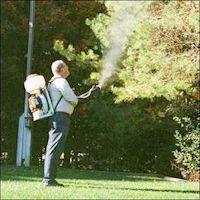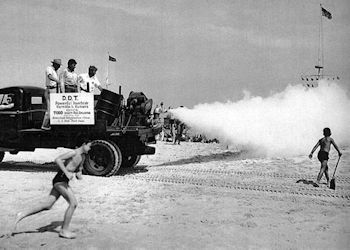MANTEO — It’s been a year since historic tides on the Outer Banks from Hurricane Irene hatched equally historic numbers of mosquitoes, prompting comparisons to locust plagues and bloodsucking vampires.
Two aerial spraying sweeps by Dare County mosquito control killed off most of the insects, but apparently the extreme infestation inspired a new boutique market.
Supporter Spotlight
 Spraying for mosquitoes has become a growing business on the Outer Banks. |
No less than six private mosquito pest contractors have started doing business in Dare County since the August 27, 2011 storm, providing personal mosquito control in homeowners’ backyards and at private events.
But with the proliferation of lawn fertilizers and herbicides and the pesticides sprayed regularly by the county during mosquito season, it’s not known what the impact of more chemicals could be to water quality, aquatic life and beneficial insects like bees and dragon flies.
The trend for personal mosquito eradication has been growing in the Southeast, especially in upscale neighborhoods in cities like Raleigh and Virginia Beach, but it’s the first time the business model has found it’s way to the swampy barrier islands.
“I’ve heard good and I’ve heard bad,” Carl Walker, Dare County’s Vector Control supervisor, said about the private service. “As far as I’m concerned, more power to them, because every one they spray, it’s less that I have to deal with.”
Lee Tugwell, an owner of OBX Mosquito Squad in Manteo, said he was on his way back from Haiti last Thanksgiving week when he noticed an advertisement in an airline magazine that called the private mosquito control business one of the fastest growing franchises in the country. Having just left an island where malaria is a health concern, while heading home to an island that had recently been subjected to epic swarms of mosquitoes, he said he thought the franchise would be a good fit for his sons and his business partner, John Robbins.
Supporter Spotlight
“We offer a personalized service,” he said. “It’s more than just spraying chemicals. Our job is to protect you and your family from the biting insects.”
As required by law, the business is certified and licensed with the N.C. Department of Agriculture & Consumer Services, and applicators must be trained. He said they use a proprietary formula of chemicals that have been approved by U.S. Environmental Protection Agency. The chemicals kill quickly and have a time-released residual with a surfactant, Tugwell said, but he declined to be specific.
“Everybody is using variations of the same stuff,” he said. “What we use is safe and effective in the manner we have to use it by law.”
Homeowners are asked to keep their pets and children inside for about 45 minutes to allow the liquid, which is misted from a backpack sprayer, to dry. The service also includes inspecting and removing any breeding grounds for mosquitoes, like old buckets and tires. Even a bottle cap with water can breed hundreds of the insects.
In addition, the company offers 100 percent natural treatments made from garlic oil extract and rosemary and peppermint oils, Tugwell said, but they’re more repellents than insect killers.
Tugwell, a former Manteo mayor who also owns a construction business, said that when Mosquito Squad put up its shingle in April, he believed it was the first of its kind on the Outer Banks. But it didn’t take long before there was competition.
 Spraying for mosquitoes along the coast has a long history. Here, DDT is sprayed on a New York beach in 1953. |
Dave Gary, owner of OBX Mosquito Man, started his Kill Devil Hills-based business around the same time. A former telecommunications specialist in Washington, Gary said that a mosquito bite in January while golfing in Nags Head led him to his unlikely career path. An authorized dealer of Mosquito Nix, a misting system similar to automatic watering systems at properties, Gary said he still mostly does backpack spraying, which kills on contact and lasts for about 21 days. He said he is careful to avoid dosing beneficial insects and by law must stay a certain distance from water.
The state monitors pesticide applicators, Gary said, but concedes that no one is “looking over my shoulder” to monitor whether it’s done properly. But there’s little incentive to ignore the rules, he said.
“Hopefully, everyone is doing the right thing,” he said. “There is not that great of an advantage for me to break the law. It doesn’t do any good to spray the water.”
Patrick Jones, deputy director of pesticide programs at the state Department of Agriculture & Consumer Services, said that there are 12 agency inspectors statewide who will investigate complaints about pesticide use. So far, there has been one complaint in 2012, and two in 2010.
Of the nine active public health commercial licenses in Dare County, he said, five were issued this year. Licenses must be renewed every year, and certification, which involves training, every five years.
Most mosquito pesticides used today are a class of pyrethroids, which are synthetic versions of pyrethrins, insecticides that are derived from the extract of chrysanthemum flowers. In the human-made chemical, a substance is added to the pyrethrin to make it more effective and to last longer.
According to the National Pesticides Telecommunications Network, pyrethrins are one of the least poisonous insecticides to mammals, but are extremely toxic to fish, including shrimp.
Although the flower component makes pyrethroids sound benign, there are serious environmental and health issues associated with them, said Fawn Pattison, executive director of nonprofit Toxic Free North Carolina.
“Any claims that it’s natural or naturally derived are totally bogus,” she said. “As far as health risks, it’s not just the active ingredients to worry about.”
Whatever inert chemicals are added to make the insecticide last longer on the surface of leaves, for instance, can potentially be toxic, she said, especially when combined with other chemicals. But there have been few studies on synergistic effects of pyrethroids on human health and the environment. Some data indicate that the pesticide acts as an endocrine disrupter, and at least one study has detected the chemical in runoff going into water bodies.
“This sort of luxury backyard spraying — it’s done with very little information about what they’re using and what the risks are,” she said. “There really has not been efficacy testing. It’s a lot of chemical use and it really doesn’t make much sense.”
Numerous studies over the years have called into question the effectiveness of spraying to kill adult mosquitoes. The Centers for Disease Control and Prevention, or CDC, in a 2001 report noted that ground and aerial spraying is usually the least effective method to control mosquitoes.
Since adult mosquitoes only live for about two weeks at the most — whether they’re sprayed or not — the CDC said the most effective way to limit mosquitoes is to keep them from breeding. And that means emptying out pools of water where they lay their eggs.
Spraying may do harm to dragon flies and other insects that prey on mosquitoes. Because they’re higher up the food chain these predators take in higher levels of pesticide. A study done in New York State found that mosquito populations increased 15 times after 11 years of spraying.
Mosquitoes carry disease like West Nile virus, which has recently been found in North Carolina, and encephalitis. For that reason, state regulators say the risk of pesticide use has to be countered by the public health benefit of mosquito control.
“When you’re talking about pesticides, you can’t really talk about ‘safe,’” said John Allran, environmental toxicologist with the state Agriculture Department. “You can talk about a relative degree of toxicity. Any pesticide, by the nature of what it is, it’s intended to kill something.”
But that’s why there are strict guidelines and regulations on the way the chemicals are used, he said, and each product must be labeled with restrictions and the necessary information on its safe application. Information on the products that are used also must be provided to the customer.
 Mike Waldvogel |
“The label is written in such a way to prevent any adverse effects to human health or the environment,” Allran said. “If there are any reports of misuse, it has to be inspected.”
Mosquito control is effective only when it’s done in an “organized” effort and managed properly, said Mike Waldvogel, N.C. State University Extension associate professor. And ultimately, he said, it should be weighted toward the greater good.
Private contract spraying can temporarily address the nuisance factor, he said, but it does nothing to address the cause of the problem. It might make sense for a special event, but it’s questionable how effective it will be against vicious salt marsh mosquitoes that can fly five miles.
“Mosquitoes don’t respect property lines,” he said. “They see you as their lunch.”







